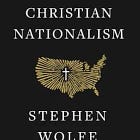The Case for Christian Nationalism
8. The Right to Revolution | V. Lesser Magistrates
Previously:
Wolfe writes of the “lesser magistrate doctrine”, that “violent resistance against tyranny” can only be considered legitimate if sanctioned by an intermediary magistrate between the people and the tyrant. He strangely objects to this being labeled a “doctrine”, due to it not being “determined by a collegia of clerics”, but instead says it flows what he seemingly endorses as a superior source of “natural principles”.1 Considering he made such a fervent case that these natural principles supposedly lead directly to nationalism and the “highest good”, so much so that “the Gospel does not supersede, abrogate, eliminate, or fundamentally alter generic nationalism”2, it makes little sense that he would take umbrage with the semantics of the word “doctrine”, unless he considers the determination of clerics to be subordinate, in civil determinations, to human interpretations of “natural principles”.
People can justly act apart from a lesser magistrate or an established interposing body. That is, they can act for themselves outside any higher earthly authority. But their actions are limited and cannot properly be called acts of the people.3
By this principle, if the majority of the people, none of whom are magistrates, gather a preponderant force, it would not be an “act of the people”, but if a minority of the citizenry recruited a magistrate then it would be an “act of the people”. This can only make sense to someone seeking to justify a revolution by a minority. Secondly, what level magistrate is required for such legitimacy? In our nation, would you need an elected, federal official or a general, or would a city councilman meet the quota? Wolfe makes no effort to specify what level of responsibility must be held by the intervening magistrate to constitute a legitimate revolution.
He then uses the Continental Congress as an example of a lesser magistrate, but it does not suffice for making the case of just revolution by the minority. The Continental Congress was the official representation of the people from all British, coastal colonies south of Nova Scotia and lobbied for the majority of British subjects in North America. All of them voted to secede. Overall, this section does little to nothing to clarify “the efficient cause of revolution.” The lack of specifics on the lesser-magistrate leaves more questions than answers. The notion of “the people’s concrete actions of force, directed as a whole by the interposing authority” (emphasis mine)4 requires more than three vague paragraphs over two pages to be at all convincing. Who is this director? What are his minimum qualifications? If this is meant to be the initial position of the Christian Prince, it only makes him more analogous to el Caudillo or il Duce.
Previously:
Stephen Wolfe, The Case for Christian Nationalism (Moscow, Idaho: Canon Press, 2022), 348.
Ibid., 11.
Ibid., 349.
Ibid., 349.



